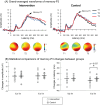Effects of 6-Month Combined Physical Exercise and Cognitive Training on Neuropsychological and Neurophysiological Function in Older Adults with Subjective Cognitive Decline: A Randomized Controlled Trial
- PMID: 38848174
- PMCID: PMC11307082
- DOI: 10.3233/JAD-231257
Effects of 6-Month Combined Physical Exercise and Cognitive Training on Neuropsychological and Neurophysiological Function in Older Adults with Subjective Cognitive Decline: A Randomized Controlled Trial
Abstract
Background: Multidomain intervention may delay or ameliorate cognitive decline in older adults at risk of Alzheimer's disease, particularly in the memory and inhibitory functions. However, no study systematically investigates the changes of brain function in cognitively-normal elderly with subjective cognitive decline (SCD) when they receive multidomain intervention.
Objective: We aimed to examine whether a multidomain intervention could improve neuropsychological function and neurophysiological activities related to memory and inhibitory function in SCD subjects.
Methods: Eight clusters with a total of 50 community-dwelling SCD older adults were single-blind, randomized into intervention group, which received physical and cognitive training, or control group, which received treatment as usual. For the neuropsychological function, a composite Z score from six cognitive tests was calculated and compared between two groups. For the neurophysiological activities, event-related potentials (ERPs) of memory function, including mismatch negativity (MMN) and memory-P3, as well as ERPs of inhibitory function, including sensory gating (SG) and inhibition-P3, were measured. Assessments were performed at baseline (T1), end of the intervention (T2), and 6 months after T2 (T3).
Results: For the neuropsychological function, the effect was not observed after the intervention. For the neurophysiological activities, improved MMN responses of ΔT2-T1 were observed in the intervention group versus the control group. The multidomain intervention produced a sustained effect on memory-P3 latencies of ΔT3-T1. However, there were no significant differences in changes of SG and inhibition-P3 between intervention and control groups.
Conclusions: While not impactful on neuropsychological function, multidomain intervention enhances specific neurophysiological activities associated with memory function.
Keywords: Alzheimer’s disease; P3; event-related potential; lifestyle intervention; mismatch negativity; multidomain intervention; occupational therapy.
Conflict of interest statement
The authors have no conflict of interest to report.
Figures




Similar articles
-
Effects of multidomain versus single-domain training on executive control and memory in older adults: study protocol for a randomized controlled trial.Trials. 2020 May 14;21(1):404. doi: 10.1186/s13063-020-04293-3. Trials. 2020. PMID: 32410715 Free PMC article.
-
Efficacy and mechanisms of combined aerobic exercise and cognitive training in mild cognitive impairment: study protocol of the ACT trial.Trials. 2018 Dec 22;19(1):700. doi: 10.1186/s13063-018-3054-0. Trials. 2018. PMID: 30577848 Free PMC article.
-
Effects of home-based exercise alone or combined with cognitive training on cognition in community-dwelling older adults: A randomized clinical trial.Exp Gerontol. 2024 Dec;198:112628. doi: 10.1016/j.exger.2024.112628. Epub 2024 Nov 9. Exp Gerontol. 2024. PMID: 39505286 Clinical Trial.
-
The Efficacy of Cognitive Intervention in Mild Cognitive Impairment (MCI): a Meta-Analysis of Outcomes on Neuropsychological Measures.Neuropsychol Rev. 2017 Dec;27(4):440-484. doi: 10.1007/s11065-017-9363-3. Epub 2017 Dec 27. Neuropsychol Rev. 2017. PMID: 29282641 Free PMC article.
-
Advances in Non-Pharmacological Interventions for Subjective Cognitive Decline: A Systematic Review and Meta-Analysis.J Alzheimers Dis. 2020;77(2):903-920. doi: 10.3233/JAD-191295. J Alzheimers Dis. 2020. PMID: 32741806
Cited by
-
Targeting brain health in subjective cognitive decline: insights from a multidomain randomized controlled trial.Aging Clin Exp Res. 2025 May 14;37(1):151. doi: 10.1007/s40520-025-03062-z. Aging Clin Exp Res. 2025. PMID: 40366507 Free PMC article. Clinical Trial.
-
Development of a Predictive Model for the Progression of Subjective Cognitive Decline: A Longitudinal Study.Brain Behav. 2025 Aug;15(8):e70719. doi: 10.1002/brb3.70719. Brain Behav. 2025. PMID: 40791028 Free PMC article.
References
-
- Jessen F, Amariglio RE, van Boxtel M, Breteler M, Ceccaldi M, Chetelat G, Dubois B, Dufouil C, Ellis KA, van der Flier WM, Glodzik L, van Harten AC, de Leon MJ, McHugh P, Mielke MM, Molinuevo JL, Mosconi L, Osorio RS, Perrotin A, Petersen RC, Rabin LA, Rami L, Reisberg B, Rentz DM, Sachdev PS, de la Sayette V, Saykin AJ, Scheltens P, Shulman MB, Slavin MJ, Sperling RA, Stewart R, Uspenskaya O, Vellas B, Visser PJ, Wagner M (2014) A conceptual framework for research on subjective cognitive decline in preclinical Alzheimer’s disease. Alzheimers Dement 10, 844–852. - PMC - PubMed
-
- Buckley RF, Maruff P, Ames D, Bourgeat P, Martins RN, Masters CL, Rainey-Smith S, Lautenschlager N, Rowe CC, Savage G, Villemagne VL, Ellis KA (2016) Subjective memory decline predicts greater rates of clinical progression in preclinical Alzheimer’s disease. Alzheimers Dement 12, 796–804. - PubMed
-
- Koppara A, Wagner M, Lange C, Ernst A, Wiese B, Konig HH, Brettschneider C, Riedel-Heller S, Luppa M, Weyerer S, Werle J, Bickel H, Mosch E, Pentzek M, Fuchs A, Wolfsgruber S, Beauducel A, Scherer M, Maier W, Jessen F (2015) Cognitive performance before and after the onset of subjective cognitive decline in old age. Alzheimers Dement (Amst) 1, 194–205. - PMC - PubMed
Publication types
MeSH terms
LinkOut - more resources
Full Text Sources
Medical

